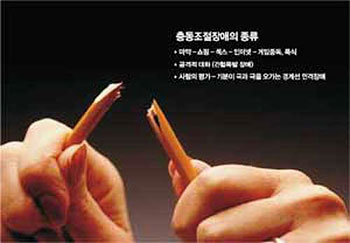Sudden Burst of Anger, Fit of Rage: A Disease?
Sudden Burst of Anger, Fit of Rage: A Disease?
Posted October. 19, 2003 23:18,

Mr. Lee (39) is called Moo-Daeri (colloquial simile meaning one is without sense). Every morning, he places his hands on the steering wheel and makes an oath to himself that he would never fight with his boss that day. He listens to quiet music to calm his temper. However, every time he does this ritual, it goes all in vain. He finds himself raising his voice rapidly after his boss makes a sarcastic remark about him. Without fail, he regrets his action.
These days, it is not difficult to witness people making offensive remarks and even practicing violence on others, not being able to tolerate ones boiling temper during conversation. Some commit crime out of impulse to resolve problems caused by internet gambling, sex, shopping, and drugs and thus lead oneself to destruction.
Politicians make remarks without much thinking and out of impulse, which of course could have been saved by some consideration, and raise whole disturbances. We see some of those cases happening and some politicians withdrawing from their office.
All of these happened because of failure to control ones impulse. Korean society in the twenty-first century is where the disease called impulse gets around like a ghost.
Impulse Control Disorders: Medically, impulse comes out the limbic system which undertakes emotions and memories. Originally, impulses are synchronized between the limbic system and the frontal lobe which undertakes rational thinking.
People who are inclined to do something even though they are obviously aware that it will cause them trouble later on can be said that they are a case of Impulse Control Disorders with a problem in their control system.
Types of Impulse Control Disorders: Every addiction is a typical example of Impulse Control Disorders. DSM-IV, a recognition list of psychiatric disease of the U.S., classifies Kleptomania and Pathological Gambling as these. Experts explain that addiction to shopping, sex, internet, game, alcohols, and drugs and intemperance are included to the list.
People, who do not fall into this category but cannot control impulses in their daily lives and repeat problematic behaviors, are included in the large definition of Impulse Control Disorders. People with Intermittent Explosive Disorder who cannot endure ones impulse to be aggressive when having conversation is easily witnessed in our surrounding. People with Borderline Personality Disorder who move from extremes to extremes in feelings or in interacting with others cannot control their impulses. People with Attention Deficit Hyper Activity Disorder who get tired of one thing easily and get nervous and overactive about everything have difficulties in controlling their impulses.
Why many impulse control disorders in Korea: According to psychiatrists, one loses control while having a conversation because someone stimulated suppressed parts of ones unconsciousness. This also means that it is hard to express ones opinion rationally in a Korean society with many social taboos.
People with raging temper indicate that they explode and go out of their control after a long time of suppressing ones feelings. There are research results that there are increasing number of Borderline Personality Disorder and addictions when social norms and moral principles dismantle. Our society, having many numbers of Impulse Control Disorders, implies that we are going through a rapid disintegration.
Cure and Precaution: It is recommended that people with addictions on the psychiatric recognition list see a psychiatrist right away. Normal impulsive control disorders can be cured with medicinal therapy. Tricyclic antidepressants that include Ritalin that vitalizes the frontal lobe and serotonin, a neurotransmitter can be taken. In order to raise a child without being impulsive, it is important to teach him/her to express oneself properly and not to badger. Also, instead of teaching which is right or wrong, it is better to teach him/her judge good and bad logically and help develop the frontal lobe in the brain. Also, parents should help relieve the conflicts and stress accumulated in their unconsciousness through daily entertainment and leisure. Alcohol is not a good solution. Drinking too much damages ones impulse control system in the brain, making one more impulsive.
However, impetuosity is generally related to ones personality and unconsciousness, and is hard to be resolved. We recommend one with such an impetuosity to consult a psychiatrist.
(Reference: Professor of Neuropsychiatry Ryu, In-gyoon Seoul National University Hospital)
Seong-Ju Lee stein33@donga.com







